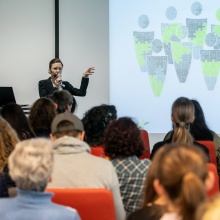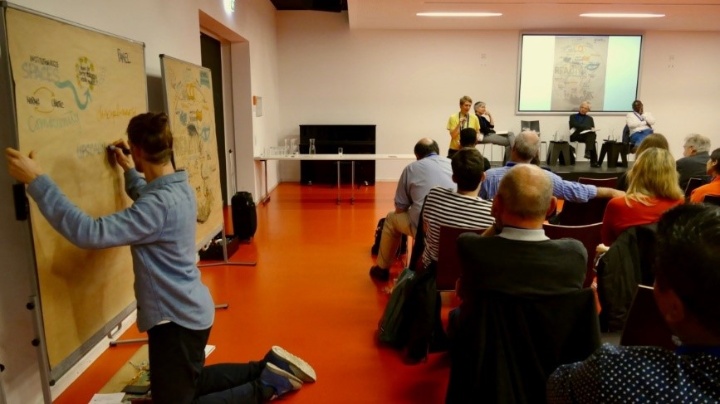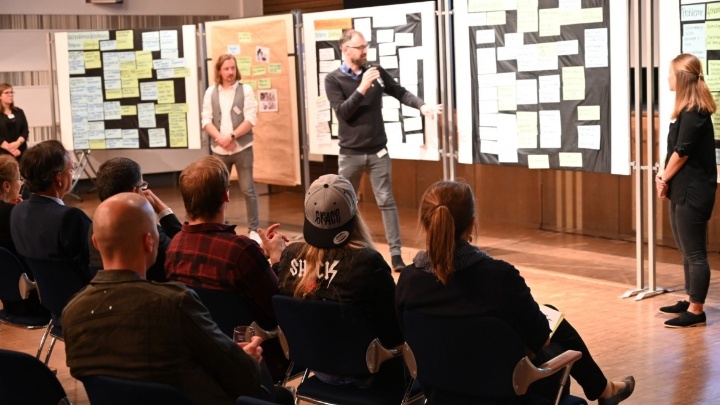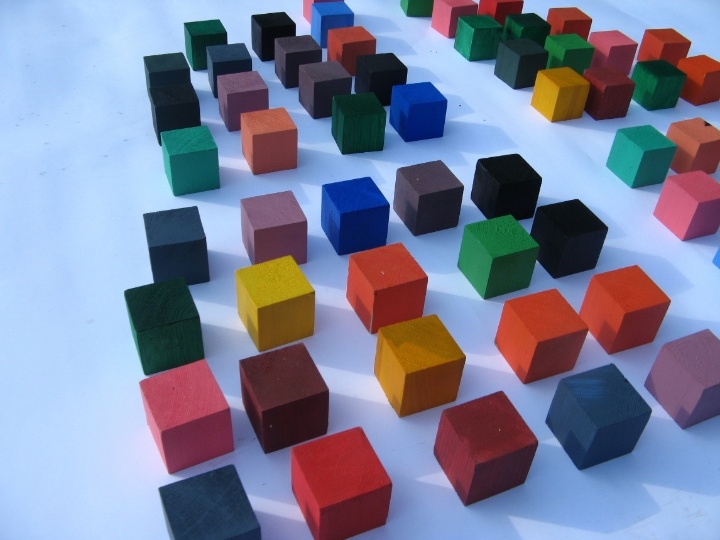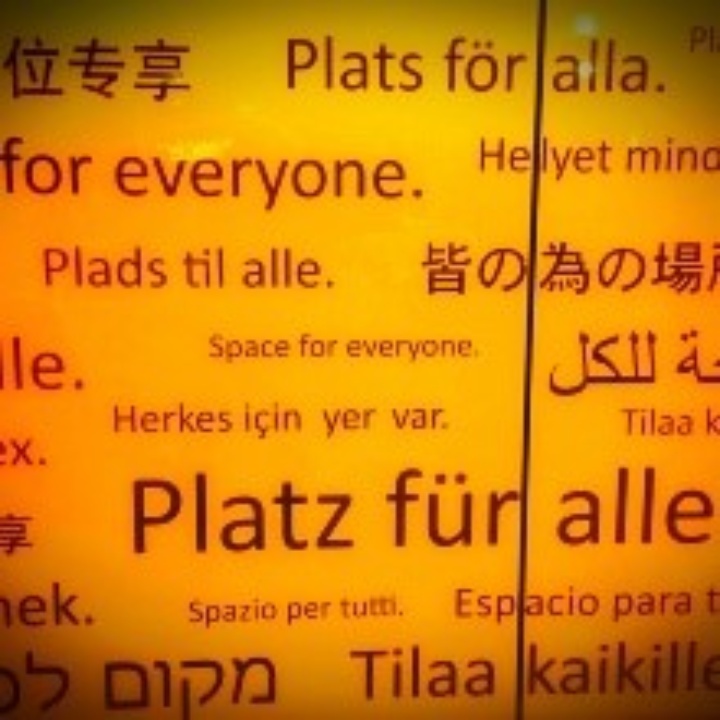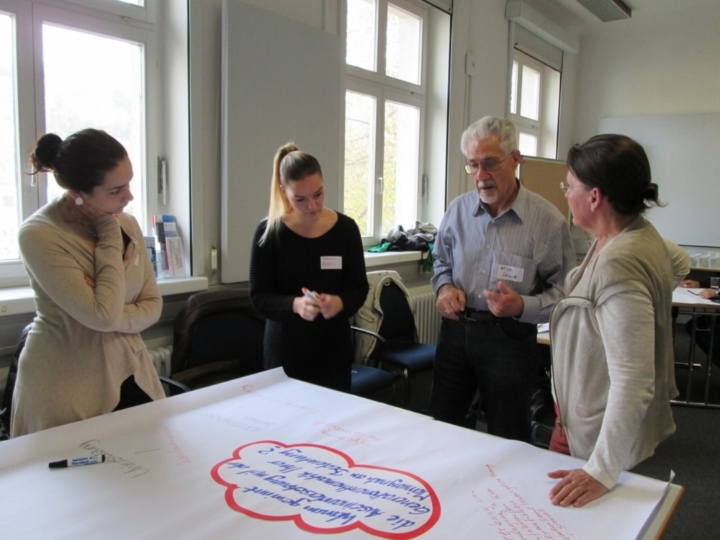At the University of Stuttgart, more than 3000 scientists in various disciplines are constantly acquiring new knowledge. Its application and integration is essential for further development and the common good of society. Since the university was founded, this transfer of knowledge has been one of our core concerns and is traditionally done, for example, by teaching our students.
- Uni for all
lecture series, education courses, extra-mural courses
Transfer formats, further education, and dialog
In order to reach society and economy even better, the University of Stuttgart is working on new transfer formats and their further development. In seminars, workshops, and professional development courses, researchers impart academic knowledge with a focus on the transfer from theory to practice. In dialog and communication formats, they transfer relevant research content to the public and enable feedback from society into research and teaching.
Social responsibility
The steady improvement of knowledge transfer not only means that the university’s research findings are communicated more broadly to the general public, but also that they arrive there with less delay and have an impact on the university’s development as a socially responsible player.
Knowledge transfer at the University of Stuttgart
The International Center for Cultural and Technological Studies (IZKT) is a central knowledge transfer structure in which the University of Stuttgart is visible as a socially responsible player and initiator of relevant debates and transformations. Since 2002, the IZKT has been researching the interaction between technological and social developments, as well as communicating and transferring the findings to the public. As a forum for interdisciplinary and transdisciplinary exchange, external scientific communication, dialog with the public, and the collaboration with research and teaching projects, it enables knowledge transfer that is oriented towards the common good and systematically combines research, teaching, and participation.
The Center for Interdisciplinary Risk and Innovation Studies at the University of Stuttgart (ZIRIUS) is a central scientific institution and a cross-departmental research center. Across the disciplines and in cooperation with partners from science, business, politics, and the public, ZIRIUS investigates the requirements, framework conditions, opportunities, and risks of socio-technical transformation processes.
By establishing the “Interchange Forum for Reflecting on Intelligent Systems (IRIS)”, the University of Stuttgart assumes further responsibility as an active player in society. As a forum for interdisciplinary exchange and transdisciplinary reflection, IRIS provides starting points for the fusion of visionary technologies and new social challenges.
The team at the Stuttgart Change Labs supports student projects and initiatives that are committed to the sustainable education and development of the university and society. Students assume social responsibility in their projects and are engaged in society. They learn to apply their specialist and interdisciplinary knowledge in projects. Connecting theory and practice at an early stage keeps them motivated in their studies.
The Stuttgart Change Labs are a cross-faculty project, with the Vice Rector for Teaching and Continuing Education, Prof. Hansgeorg Binz, as the responsible member of the university management and Prof. Markus Allmann from Faculty 1 as the project manager. The project is supported by the Ministry of Science, Research and the Arts of Baden-Württemberg under the funding program “Successful Study in Baden-Württemberg: Learning and Teaching Labs”.
The Coordination of Scientific Further Education (KWW) at the Center for Higher Education and Life-Long Learning acts as the link between bearers of knowledge at the university and interest groups from business, industry, management, and society.
As an interface between research, teaching, business, and industry, KWW offers its participants from various business areas and professions a dialog platform where they can discuss ideas from both inside and outside the university - very much in the spirit of life-long learning.
The extra-mural courses at the University of Stuttgart are very popular in the city and the region. Every semester, up to 1100 interested people - from high school graduates and employed persons to retirees - attend the numerous lectures, series of talks, seminars, and workshops. Regardless of their origin, age, education, and profession, everyone can become an extra-mural student and continue their interdisciplinary education as part of life-long learning.
There are no pre-structured study programs or specific modules. Extra-mural students select their courses freely and individually according to their interests.
The Center for Higher Education and Lifelong Learning (ZLW) is the service point for extra-mural students. There, interested persons receive all information about extra-mural courses and, when needed, personal advice. The course brochure, which is published every semester, is also available at the ZLW. There are introductory events for newcomers at the beginning of every semester.
Real-world laboratories are a program launched by the state of Baden-Wuerttemberg that has researchers enter into real-world change processes as their experimental field. For example, in real-world laboratories they give advice and support to urban renewal or the introduction of new mobility and energy systems. In so doing, they involve practitioners from communes, social and environmental organizations or businesses and ordinary citizens in the research process. In an open-ended process knowledge is created that is intended to make a practical impact.
- Research and teaching in Real-World Laboratories, platform for research & open science
Current Projects
- Campus hoch i [de]
- MobiLab
- Klima-RT-LAB, climate-neutral heat supply for the city of Reutlingen
- Real-world laboratory GWP, industrial heat pumps in heating systems


